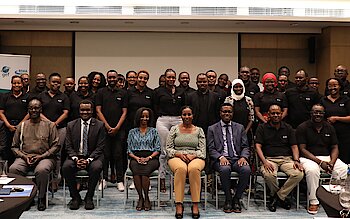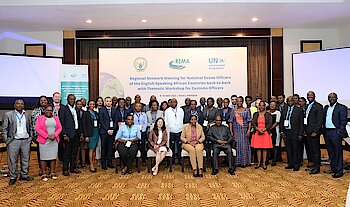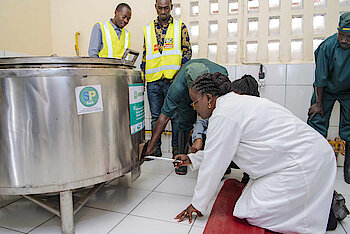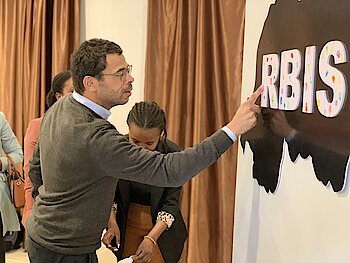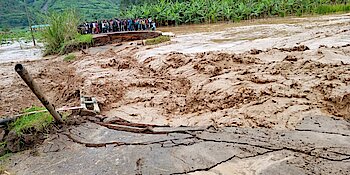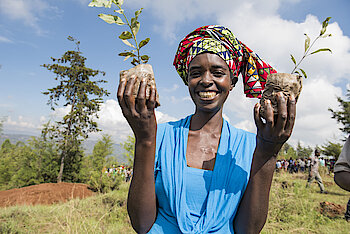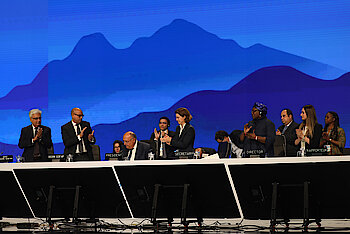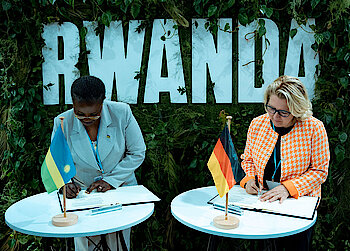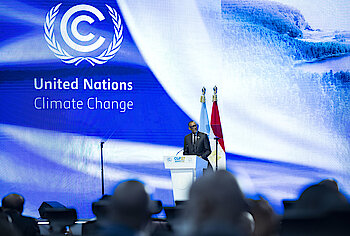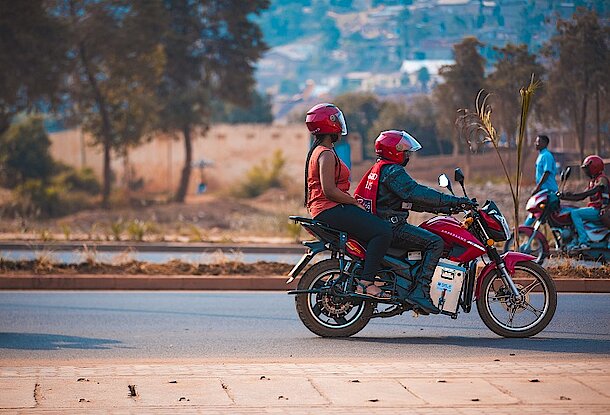
Six ways Rwanda is building climate resilient transport systems
Over the last decade, Rwanda has invested in building efficient and resilient transport systems. Guided by the country’s Green Growth and Climate Resilience Strategy (GGCRS), the Government of Rwanda has carried out numerous initiatives to promote sustainable mobility and the green economy at large.
Road transport accounts for 13% of total greenhouse gas emissions in Rwanda and this is expected to continue to rise. That is why developing efficient and resilient transport systems is one of 14 programmes of action under the GGCRS. This specific programme of action has four key components that include:
- Improving the efficiency of the internal combustion engine (ICE) vehicles measured by reduction in emissions per kilometre
- Awareness of new technology
- Investments in infrastructure
- Developing efficient operational systems measured by reduction in emissions per km.
Here are six ways Rwanda is building resilient and efficient transport systems at both the national and local levels.
- Developing a national sustainable mobility policy
Rwanda is developing a national sustainable mobility policy to facilitate the transition to e-mobility as the country continues strives for low carbon economic growth. The policy will strengthen collaboration between the private sector and the Government of Rwanda, attract investment in electric mobility solutions, foster new transport innovations and enhance the usage of non-motorised transport as a part of a wider transit oriented development policy.
- Attracting e-mobility investments
Rwanda has seen an increase in major e-mobility investments thanks to the country’s friendly doing business environment. For example, VW Mobility Solutions,Victoria Autofast Rwanda, Ampersand, Rwanda Electric Motorcycle Ltd and Safi/Gura Ride have all significantly invested in electric cars and motorbikes. Rwanda welcomes investments that support the transition to clean and green mobility.
- Introducing e-mobility incentives
The estimated cost of transitioning to e-mobility and the adoption of electric vehicles in Rwanda is US $900 million. However, transitioning to electric motorcycles alone would save the Rwandan economy Rwf 23 billion (US $22 million) in fuel imports every year.
That’s why the Government of Rwanda has introduced numerous fiscal and non-fiscal incentives to fast-track the electric mobility transition and attract additional investments in the growing industry. These incentives include:
- Low Charging Costs: Costs for charging stations will be priced at the lowest industrial tariff, which is significantly lower than the residential tariff. Electric vehicle owners will also benefit from reduced tariffs when charging during off peak hours - from 11pm to 8am.
- Tax Breaks: Electric vehicles, spare parts, batteries and charging station equipment are now exempted from import and excise duties, zero rated for Value Added Tax and spare parts, batteries and other equipment will also be exempted from withholding tax.
- Provision of land: Companies setting up charging stations across the country can now access government owned land on a rent-free basis.
- Promoting Local Production: Companies manufacturing and assembling electric vehicles in Rwanda can now enjoy a 15 percent Corporate Income Tax rate and tax holiday.
These incentives will make it easier for Rwandans to be part of the country’s efforts to reduce air pollution and greenhouse gas emissions.
- Expanding and enhancing public transport networks
Rwanda has been working to improve public transport infrastructure. In 2012, the government approved the Public Transport Policy and Strategy and the Ministry of Infrastructure ensures the national road network is expanded, rehabilitated, upgraded, and maintained. The same direction was reiterated in the overall National Transport Policy and Strategy for Rwanda adopted by Cabinet in April 2021, where the infrastructure development aims to ensure public transport connects different areas of the country, thus contributing to sustainable economic growth.
The City of Kigali is also working to increase the number of bus stations in Kigali and upgrade existing infrastructure to build the capacity of the city’s public transport network.
- Improving the quality of public transport systems
The Government of Rwanda, through the Rwanda Utilities Regulatory Authority, recently introduced the Public Transport Generation 2. The new system aims to improve public transport by increasing the use of technology, improving route planning, fostering a better vehicle mix and introducing a scheduled service.
To improve public transport, buses in Kigali are equipped with free internet for passengers and make public transport more attractive to users, thus discouraging usage of private cars. The provision of the internet is part of the Smart Kigali Initiative launched in 2013 to provide free wireless connection in buses and taxis, airports, hotels and restaurants among other places.
In line with electrification of mobility, Rwanda aims to have 20% of all buses electric by 2030, which will result in an estimated reduction of 72,000 tCO2eq.
- Partnering to achieve sustainable mobility
The Government of Rwanda is working with a range of partners to achieve sustainable mobility and an efficient and resilient transport system. Key partners are the Global Green Growth Institute (GGGI), UNEP, KfW, International Finance Corporation (IFC) and the World Bank (WB). These partners are working with the Ministry of Infrastructure and other government institutions on the following activities:
- Background and feasibility study on introduction of electric vehicles in Rwanda: In partnership with UNEP and KfW, a study was conducted to assess the feasibility of introduction of electric vehicles in Rwanda. This study sheds light on benefits in terms of emissions reduction, impacts on energy consumption, and other cross cutting issues associated with the new technology namely job creation, poverty reduction and gender dimensions.
- E-mobility Showcase: In collaboration with Rwanda Environment Management Authority, Ministry of Environment and the Ministry of Infrastructure, GGGI hosted an e-mobility showcase on current and emerging technologies in Rwanda and connected companies with potential investors in the region and internationally.
- Electric Buses: GGGI has been providing support to the Government of Rwanda to prepare a conducive environment and bridging the knowledge gap for the uptake of electric buses – first within the City of Kigali, and eventually to other urban centers in the country. The team has supported by promoting investment, helping to produce an Electric Bus Charging Infrastructure Report and training government staff on e-Bus System Planning and Optimisation.
- Electric Buses: IFC has initiated a study to assess the feasibility of e-buses in Kigali and inform the Government of Rwanda on potential PPP model for deploying e-buses in Kigali for start up and with a possibility to replicate a model for larger scale deployment in the rest of Rwanda. This work is to be complemented by concurrent work conducted by IFC to develop a diagnostic framework to prioritize and evaluate selected Sub-Saharan African cities’ potential for adoption of e-mobility solutions.
Through a partnership with the United Nations Development Programme, the Rwanda Environment Management Authority (REMA) has also joined the effort to promote electric vehicles, including the following initiatives:
- Plug-In Hybrid Vehicle: REMA recently launched its first ever plug-in hybrid electric vehicle (PHEV) that will support the institution to fulfill its mandate of environmental protection and showcase that electric vehicle usage is possible in Rwanda.
- Converting ICE motorbikes to e-bikes: The United Nations Development Programme is also supporting REMA to retrofit 80 internal combustion engine motorbikes to electric motorbikes through a local company, Rwanda Electric Mobility. The initiative will support efforts to phase out polluting internal combustion engine motorcycles, particularly the motorcycle taxi fleet, which accounts for more than 80% of motorcycles in Rwanda. At least 40% of motorcycles, especially moto-taxis, will be eligible for the programme. Rwanda Electric Mobility aims to retrofit up to 30,000 motorcycles over the next five years.
Topics
More posts
REMA LAUNCHES THE EVIDENCE-BASED CLIMATE REPORTING INITIATIVE TO ADVANCE CLIMATE RESEARCH AND REPORTING
The Rwanda Environment Management Authority (REMA) in collaboration with the African Institute of Mathematical Sciences (AIMS) have on May 19, 2023…
NATIONAL OZONE OFFICERS MEET IN KIGALI TO DISCUSS THE IMPLEMENTATION OF MONTREAL PROTOCOL AND ITS KIGALI AMENDMENT
The Rwanda Environment Management Authority (REMA) in collaboration with the United Nations Environment Programme (UNEP)’s OzonAction has organized a…
REMA OFFICIALLY LAUNCHES THE LPGS DONATED TO 20 SCHOOLS IN GREEN AMAYAGA PROJECT INTERVENTION AREA
The Minister of Environment, Dr. Jeanne d’Arc Mujawamariya has on 3rd May 2023 launched the use of Liquefied Petroleum Gas (LPG) for bulk cooking in…
The Rwanda Biodiversity Information System to Drive Climate Change Adaptation and Conservation was launched
The Center of Excellence in Biodiversity and Natural Resource Management at the University of Rwanda has launched the Rwanda Biodiversity Information…
Essential things to know about the loss and damage due to climate change
The evidence of both global and local climate change impact is beyond dispute. There are clear effects of climate change occurring all across the…
Why Women’s Consideration is a Key in battling climate change impacts?
The livelihoods of billions of people throughout the world are highly impacted by climate change, despite efforts to reduce its hazards. This is…
Rwanda welcomes COP27 outcomes on climate damages fund and keeping 1.5 degree goal alive
The Government of Rwanda has welcomed the outcomes of the 27th United Nations Climate Change Conference, known as COP27. At the meeting, nations…
Rwanda launches new EUR 46M facility to finance public sector climate action
Rwanda has launched a new facility that will invest in climate action led by the public sector on the sidelines of COP27 in Sharm El-Sheik, Egypt. The…
NATIONAL STATEMENT BY PRESIDENT PAUL KAGAME AT COP27
First, I express my appreciation to President Sisi, and the Government and people of the Arab Republic of Egypt, for hosting us in beautiful Sharm El…
